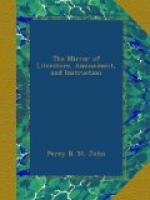In 1827, appeared “The Epicurean,” a tale of extreme grace and feeling, and conveying the sublime lessons of Epicurus, in one of the most attractive of poetico-prosaic forms. In picturesque knowledge, splendid descriptions, startling and mysterious incidents, and intellectual riches, this work is almost unparalleled in our language; and, observes an elegant critic, “the narrative sweeps along, like a mild and glassy river winding through banks of the most brilliant verdure, sometimes sparkling and bubbling to the sunshine of fancy, and at intervals solemnly gliding on with a deep under-current of philosophy.”
The contributions of Mr. Moore to one of the most powerful of the London journals are too well recognised by the public to require further than a passing notice of their being recently published in an elegant little volume, entitled “Odes upon Cash, Corn, Catholics, and other Matters;” and we believe them to be entitled by their raciness and humour to a niche in the library, beyond the destructible form of a newspaper.
In this brief Memoir, we have little more than glanced at Mr. Moore’s several works, and the periods of their publication; although we could crowd our pages with the highest testimonials of their poetical and literary merits. Much as we admire “his wit, his festive merriment, and inimitable satires, and the ingenious imagery, and the elaborate melody and finish of every period of his prose”—we are disposed to think him pre-eminently successful in delineating the plaintive and pensive woes of deep and settled melancholy: thus—
As a beam o’er the face of the waters
may glow,
While the tide runs in darkness and coldness
below;
So the cheek may be tinged with a warm
sunny smile,
Though the cold heart to ruin runs darkly
the while.
We have already noticed the taste of Mr. Moore for music. “Nor has he neglected those more solid attainments which should ever distinguish the well-bred gentleman, for he is an excellent general scholar, and particularly well-read in the literature of the middle ages. His conversational powers are great, and his modest and unassuming manners have placed him in the highest rank of cultivated society.” Although his reputation is so well established, he speaks of himself with his wonted modesty. “Whatever fame he might have acquired he attributed principally to the verses which he had adapted to the delicious strains of Irish melody. His verses, in themselves, could boast of but little merit; but like flies preserved in amber, they were esteemed in consequence of the precious material by which they were surrounded.”
Sheridan, in speaking of the subject of this memoir, said “That there was no man who put so much of his heart into his fancy as Tom Moore; that his soul seemed as if it were a particle of fire separated from the sun; and was always fluttering to get back to that source of light and heat.” Lord Byron, too, distinguished Moore as “a name consecrated by unshaken public principle, and the most undoubted and various talents.”




